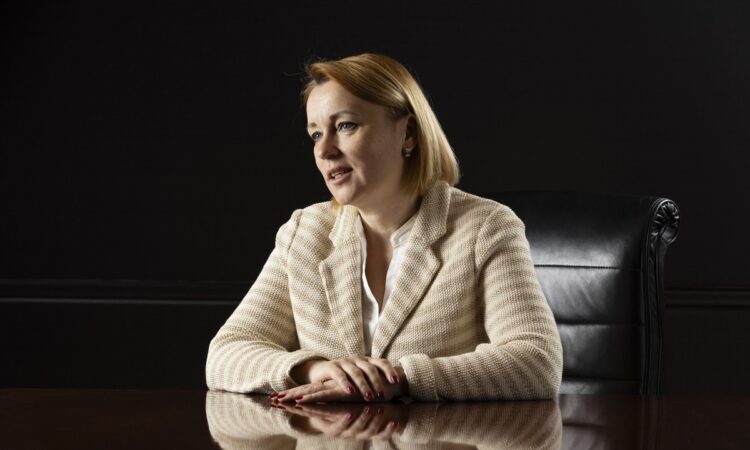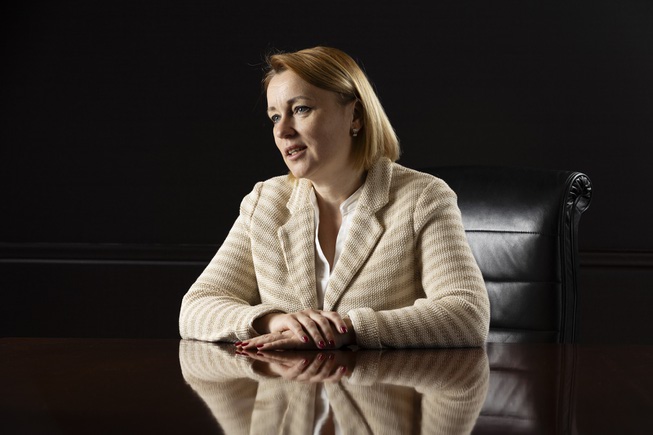

European Union Ambassador to the United States Jovita Neliupšienė speaks during an interview Thursday, April 25, 2024.
Saturday, April 27, 2024 | 2 a.m.
Nevada is one of about a half-dozen states that Jovita Neliupšienė, the European Union’s ambassador to the United States, is visiting in the first few months of her tenure.
The Sun sat down with Neliupšienė, who is from Lithuania and stepped into her new role in January, during her recent trip to Las Vegas, where she discussed post-pandemic visitation between the EU and Las Vegas, and trade between both destinations, as well as the war in Ukraine and the importance of a diverse, sustainable economy in light of climate change.
The following Q&A has been edited for length and clarity.
What’s your initial impression of Nevada?
It’s a place to be, probably for the tourists. The numbers of, especially, European tourists are coming back and growing. …As well, there are lots of things to do. That’s probably what attracts everyone to come here. I looked for the numbers — if we compare 2022 and the last year, around 50% of tourists (are) back from Europe. That’s probably a promising number because the COVID — it was not really so successful for hotels and for tourism.
A recent report showed international visitation to Las Vegas seeing its best year since 2019. How do you see visitation from the EU continuing to bounce back from the pandemic?
Europeans are travelers. They love travel to around the world, but first of all, to the U.S. And Las Vegas is one of the largest travel destinations for European people. The different culture, different environment and different nature of Las Vegas — this is what attracts people on one hand. On another hand, Las Vegas and Nevada (are) the place to be for business. Because if we look to the numbers not only for the tourists, but, as well, for our trade, for example, the trade is back on track. … Nevada exports almost 1 billion to EU countries (in) goods and services. Investments here, as well, have been growing. Now we account (for) almost 1.5 billion (in) total investment of EU companies, from machinery … to … semiconductors but, as well, for example, (the) critical minerals sector, which is getting more and more important for everyone.
What can Las Vegas do to incentivize visitation from the EU?
Welcoming business and hotel business is extremely attractive for everyone. The entertainment business is, as well, the thing that people coming from Europe (are) really looking for. I know that there was quite a lot of investments in the film industry, which is, as well, booming on both sides of (the) Atlantic. So exchange in this sector could be one of the things to do. And I do believe that, now, social media gives a lot of possibilities to get to know where to go, what to do — how to plan the visit.
The pandemic showed us we can’t solely rely on hospitality and gaming, so economic leaders are setting their sights on manufacturing, health care and other industries. How can we partner with the EU in some of those sectors?
If we take together how many of the jobs are created because (of) EU and Nevada trades and the EU investment in Nevada, around 40,000 people are employed because of that. So I think that our trade and economic cooperation is well on track. But if we look sector by sector, and, for example, look into the numbers, what kind of trade we have … the major bulk of that is actually in electronics and machinery. And the interesting thing (is) that if you look really deeper into statistics, you will see that we trade to each other different semiconductors. … You produce one kind, we produce another kind. So this kind of exchange shows that we actually are … complementary … and it’s extremely important to continue that.
Another element which, for Europe, is extremely important is our implementation of sustainability and green energy. And if we look (at) what is happening here in Nevada, (there’s) around 37% of energy coming from renewables. … There (is) lots of knowledge in the EU (of) how to increase the numbers and, as you know, we actually set the targets to decrease our emissions by 55% by 2030. And we will be, actually, not only reaching the target by that date, but, as well, even going up and beyond. In Las Vegas, (there’s) lots of opportunities for that and for developing technologies. … In Nevada there is, probably, one-of-a-kind lithium mines. … But it’s not only about production. One of your companies actually acquired a European company, which is recycling lithium. And this is the future, because a lot of critical minerals we need have to be recycled. This is again helping not only for the business case, but as well for the sustainability and making sure that we have a recycle economy.
Nevada has a long history of capitalizing on renewable energy sources — hydropower from nearby Hoover Dam — and we have a unique ability for solar power. What steps has the EU taken with renewable energy that we may learn from?
It’s important that it’s not only the public money and public investment, but as well, the private capital to be mobilized. And, as I mentioned, the technologies, which (the) EU is developing and have been developing for quite a lot of time. This is the thing that we share.
Climate change is the challenge which will not consider the borders. So we have to work together.
You mentioned climate change. Why are sustainable practices in our economy so increasingly important?
If you will look to the trends — what is happening right now — the climate change is dramatic. In the neighboring state of California, we see the wild forest fires almost every year. … Temperatures are jumping from the highest to the lowest in one day or some hours. And so the people will feel that and it will cost quite a lot, because we will have to move. We have to do the job now. So investing into the different options and diversifying our energy mix is really the key.
What can Nevada and the EU learn from each other economically or otherwise?
Urban development here in Las Vegas is extremely powerful. And we have been following for already a long time. Hospitality business andcompetition within the hospitality business is really what drives … quality, not only quantity. That’s the thing. The competition is the thing that drives the (EU) and we have to learn from that. And even if there were setbacks during COVID, we have to make a lesson.
Definitely for the European Union, there is another challenge because we have the war at our borders, and another war in the neighborhood. So for us, the lesson learned is that you never take for granted your own security. … It’s almost like climate change. You will never stand those kinds of challenges alone. You have to really work with your partners, friends and allies. … And again, the cooperation in the fields of semiconductors, technologies, machineries — this is what drives the economy, drives people and definitely helps to build prosperity and possibility to help, for example … Ukrainians.
What are some of your goals for Nevada and the United States’ overall relationship with the EU, and where do you see it going from here?
One of the most important elements is the strength of the transatlantic alliance, because (the) EU and (the) U.S. have been, really, partners … and building not only their democratic community but, as well, ensuring peace and prosperity for both of our continents. We have to not forget how important we are for each other, and (the) U.S. actually invested quite a lot in European security, and now (the) EU is investing in its own security. Another important element is that, for the diplomats, we tend to work in Washington, D.C., and stay there.
But diplomacy is a kinetic sport. You have to be involved in the direct matters. So, although I am — since Jan. 1 — in the U.S., I really (try) to travel quite a lot to get to know the country, to get to know the people, to get to know, really the mood. … I spent quite a lot of time on the Hill and really explaining that the war in Ukraine is existential for Europeans … for the whole transatlantic alliance and for the stability of our international system. Because if we don’t stop Russia, the others will be looking at that and then China, Iran and others will definitely see how much they can push us.
So standing strong is important. And this is the message I want to pass, but as well, listen to … how European business is doing in different states — in Nevada and others — what could be the questions for American business, which wish to have stronger ties and relations in Europe: What kind of things need to be done to ease that entrance?
So lots of that, and as I mentioned, technological cooperation is (in) really a lot of discussions on AI, on semiconductors, on quantum and all different, very fascinating things.
Do you have anything to add?
I’m looking forward to coming back, actually. … In 2008, the city looked totally different … and now I’m looking forward to coming back. I met only (the) mayor in Las Vegas, and I hope to meet (the) governor and senators.
katieann.mccarver@gmgvegas.com / 702-990-8926 / @_katieann13_






